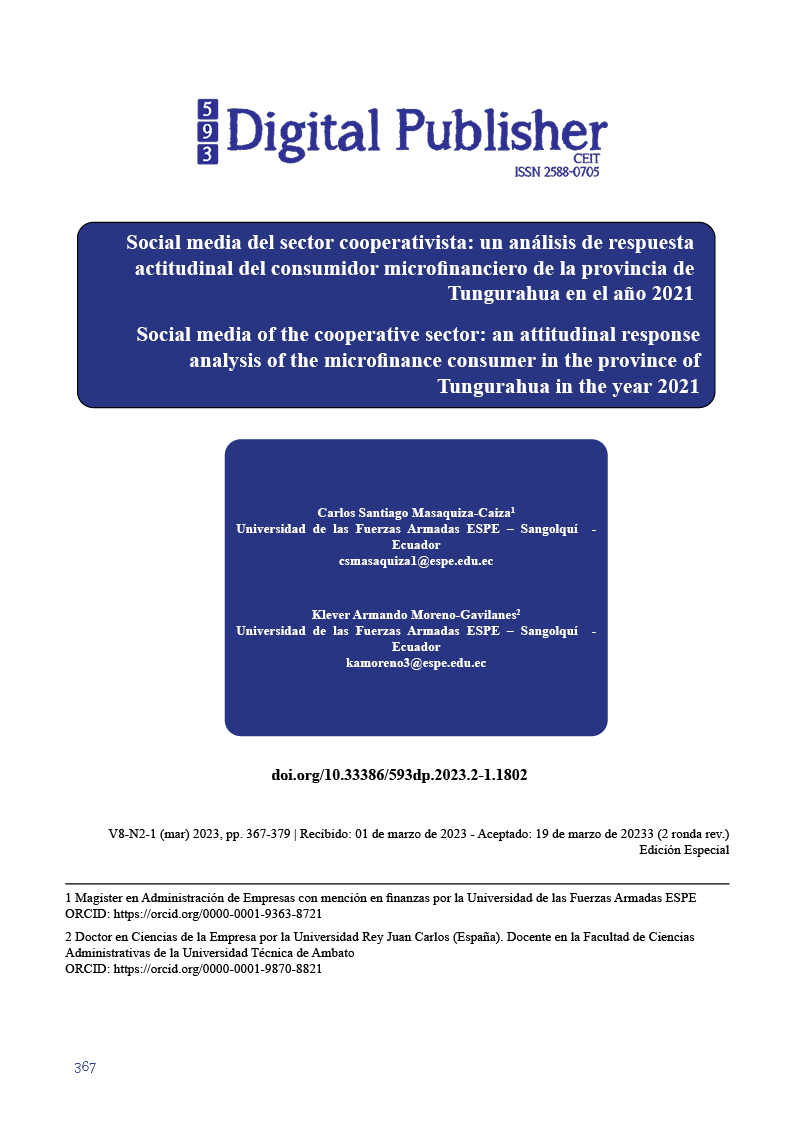Social media of the cooperative sector: an attitudinal response analysis of the microfinance consumer in the province of Tungurahua in the year 2021
Main Article Content
Abstract
The use of digital platforms and the analysis of the attitudes of the consumer of financial products are the challenge that the financial cooperative industry has acquired when immersed in the digital world. Therefore, the objective of the research was to determine the attitudes that influence social networks through the use of the coping model of user adaptation in digital platforms in the cooperative sector of the province of Tungurahua. To do this, a survey was applied to 281 members who were evaluated using the factors perceived opportunity, social influence, perceived control, enjoyment, self-improvement, fear, trust, and digital adaptation. The use of the exploratory factorial analysis method made it possible to determine the degree of correlation between the system of variables. The results revealed that the partners have perceived a positive effect on the part of the organizations according to the perceived opportunity, the social influence, the perceived control, and enjoyment. It was concluded that trust and fear are negative adaptation attitudes towards digital platforms, since there is fear when interacting between company and partner, since they show danger of exposure of their personal information.
Downloads
Article Details

This work is licensed under a Creative Commons Attribution-NonCommercial-ShareAlike 4.0 International License.
1. Derechos de autor
Las obras que se publican en 593 Digital Publisher CEIT están sujetas a los siguientes términos:
1.1. 593 Digital Publisher CEIT, conserva los derechos patrimoniales (copyright) de las obras publicadas, favorece y permite la reutilización de las mismas bajo la licencia Licencia Creative Commons 4.0 de Reconocimiento-NoComercial-CompartirIgual 4.0, por lo cual se pueden copiar, usar, difundir, transmitir y exponer públicamente, siempre que:
1.1.a. Se cite la autoría y fuente original de su publicación (revista, editorial, URL).
1.1.b. No se usen para fines comerciales u onerosos.
1.1.c. Se mencione la existencia y especificaciones de esta licencia de uso.
References
bdillah, L., Mukti, Y., Puspita, D., & Suhartini. (2021). Indonesian sharia fintech services and social media usage. Bulletin of Social Informatics Theory and Application, 5(2), 97–106. https://pubs.ascee.org/index.php/businta/article/view/456
Ahmadi, S., Irfan, M., & Sultanzoy, F. (2022). Impact of social media on agricultural extension in Afghanistan – A Case of hhmad Aba District. International Journal for Research in Applied Sciences and Biotechnology, 9(2), 67–72. https://doi.org/10.31033/ijrasb.9.2.9
Ali, G., Abdul, N., Wu, H., Iranmanesh, M., & Chee, B. (2022). Determinants of SME’s social media marketing adoption: Competitive industry as a moderator. SAGE Open, 12(1), 1–19. https://doi.org/10.1177/21582440211067220
Bernal, E., Mozas, A., Fernández, D., & Medina, M. (2021). Online popularity as a development factor for cooperatives in the winegrowing sector. Journal of Business Research, 5(3), 79–85. https://doi.org/10.1016/j.jbusres.2020.09.064
Bhadauria, G., Yadava, A., Medhekar, N., Chacko, E., Makhija, P., & Somani, P. (2022). The impact of the advertisements on the social media and networking sites. International Journal of Health Sciences, 8(4), 8017–8028. https://doi.org/10.53730/ijhs.v6ns3.7896
Calo, W. (2020). Las redes sociales en el proceso de enseñanza aprendizaje. Revista Científica Multidisciplinaria, 5(3), 273–284.
Cristobal, E., Montegut, Y., Ferrer, B., & Daries, N. (2020). Rural cooperatives in the digital age: An analysis of the Internet presence and degree of maturity of agri-food cooperatives’ e-commerce. Journal of Rural Studies, 74(26), 55–66. https://doi.org/10.1016/j.jrurstud.2019.11.011
Flores, K., González, R., & Lobo, E. (2020). Estrategia alternativa para la resolución de conflictos en las redes sociales digitales. CIID Journal, 1(1), 103–113. https://doi.org/10.46785/ciidj.v1i1.47
Ginaya, G., Somawati, N., & Bagus, G. (2022). Online cooperative learning in communication and teamwork skills development. Journal of Applied Studies in Language, 6(1), 46–52.
Hamadi, M., Den, J., Azam, S., & Sriratanaviriyakul, N. (2021). Integrating social media as cooperative learning tool in higher education classrooms: An empirical study. Journal of King Saud University - Computer and Information Sciences, 8(9), 2–10. https://doi.org/10.1016/j.jksuci.2020.12.007
Iyer, B., Gopal, G., Dave, M., & Singh, S. (2021). Centering cooperatives and cooperative identity within the social and solidarity economy: Views from the Asia-Pacific cooperative apexes and federations. Journal of Co-Operative Organization and Management, 9(2), 2–14. https://doi.org/10.1016/j.jcom.2021.100145
Liu, S., Zhu, M., & Zhang, Y. (2022). Using social network analysis to study knowledge transfer in rural destination : A case study of Nangang, China. Forest Chemicals Review, 5(4), 1476–1500.
Luzon, Y., Pinchover, R., & Khmelnitsky, E. (2022). Dynamic budget allocation for social media advertising campaigns: optimization and learning. European Journal of Operational Research, 299(1), 223–234. https://doi.org/10.1016/j.ejor.2021.08.019
Marín, I., Labrador, O., Mirabal, Y., Lorenzo, Y., & Torres, C. (2021). Institucionalización del sector cooperativo en Cuba: una propuesta necesaria. COODES Journald, 9(2), 572–592.
Martín-Rojas, R., Garrido-Moreno, A., & García-Morales, V. J. (2020). Fostering Corporate Entrepreneurship with the use of social media tools. Journal of Business Research, 112(November), 396–412. https://doi.org/10.1016/j.jbusres.2019.11.072
Megha, N., Goyal, M., & Noval, S. (2022). A systematic review on evaluating the influence of social media marketing in higher education in current scenario y future implications using the PRISMA Model. Mathematical Statistician and Engineering Applications, 71(3), 300–320.
Muyulema, C., Muyulema, J., Usca, R., & Rodríguez, R. (2022). Incidencia de la responsabilidad social Incidencia de la responsabilidad social corporativa en el desarrollo económico. Caso: Sector cooperativo financiero del segmento cuatro. Revista Ñeque, 5(12), 278–295. https://doi.org/10.33996/revistaneque.v5i12.80
Perdigón, R., & Viltres, H. (2021). Social media marketing en empresas aagrícolas cubanas. Tendencias, 22(1), 163–179. https://doi.org/10.22267/rtend.202102.159
Puebla, A., & Campos, S. (2020). Una aproximación a los factores sociales en la elaboración del balance social en el sector cooperativo de ahorro y préstamo mexicano. Revista Visión Contable, 5(21), 102–119. https://doi.org/10.24142/rvc.n21a7
Raharja, S., Muhyi, H., Chan, A., & Purbasari, R. (2022). Pelatihan social media marketing bagi pengurus koperasi-koperasi di kecamatan panyileukan kota bandung. Kumawula: Jurnal Pengabdian Kepada Masyarakat, 5(1), 115. https://doi.org/10.24198/kumawula.v5i1.36042
Ranga, B., & Ranga, I. (2012). Role of Social Media in Ecotourism Development. New Man International Journal of Multiudisciplinary Studies, 8(5), 1–20.
Rojas, M., García, V., Garrido, A., & Salmador, M. (2021). Social media use and the challenge of complexity: Evidence from the technology sector. Journal of Business Research, 6(8), 621–640. https://doi.org/10.1016/j.jbusres.2019.12.026
Sari, M. (2021). The influence of social media in learning english for hospitality and tourism students. Journal FAME, 4(1), 1–8. https://doi.org/10.30813/fame.v4i1.2798
Testa, S., Massa, S., Martini, A., & Appio, F. P. (2020). Social media-based innovation: A review of trends and a research agenda. Information and Management, 57(3), 103196. https://doi.org/10.1016/j.im.2019.103196



